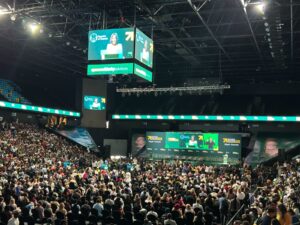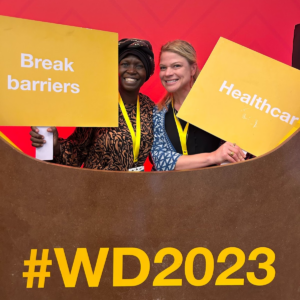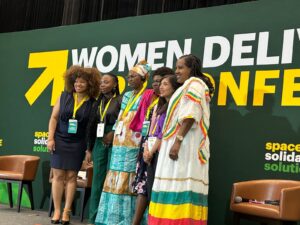A network model to unite us all
There’s nothing quite like the energy of a room buzzing with 6,000 people from vastly different backgrounds, all united by a single mission: to advance gender equality.
I recently returned from Kigali, Rwanda, where I attended the Women Deliver conference—and experienced that energizing rush—alongside my colleagues Habiba Corodhia Mohamed (above, left), regional director of programs, and Bwalya Chomba (above, right), program director for Zambia. Women Deliver is one of the world’s largest multi-sector convenings dedicated to advancing gender equality and elevating the status of women and girls.
The vast majority of the thousands of participants were women, and everyone at the conference came with a clear mission in mind: to join together in collective action. It was an incredible experience to be with so many women, from nearly every corner of the earth, all committed to advancing women’s rights and women’s leadership. My fellow attendees are working on different pieces of the equity puzzle—a puzzle that, when solved, will result in women thriving everywhere.


The venue for the Women Deliver conference in Kigali, Rwanda, was packed with thousands of advocates for women’s equality.
The women I met at the conference are passionately working to rid the world of barriers that stand in the way of women prospering. Among these barriers are gender-based violence, climate change, economic gender imbalance, and health disparities—including those caused by obstetric fistula. Collective action to break down these barriers will require a great deal of coordination. If one thing became clear to me over the four days I spent at Women Deliver, it was that both our individual success and our collective success depend on true collaboration. There is a finite amount of resources available to solve the world’s problems. We can’t be in competition. We must be in community.

As this realization crystallized for me in a crowded room filled with committed people, I couldn’t help but think of our partners—especially those within the Fistula Foundation Treatment Networks (FFTNs) in Kenya, Zambia, the Democratic Republic of Congo, and Tanzania.
A spirit of community is powerful, especially when it enables locally driven solutions. Problems can be solved faster and more holistically when there is a network of people—all with unique skill sets and areas of expertise—working toward a single, common goal.

In our FFTN model, if a partner hospital admits a fistula patient who requires a complex surgery that can’t be performed there, the partner can call on the help of a network partner that is better equipped to treat the patient. The network allows partners to “have each other’s backs,” and the result is that patients receive better, faster, more carefully coordinated care. It’s a win-win. The network model also makes treating obstetric fistula a team effort, creating a shared responsibility for each patient and keeping every partner accountable for the desired outcome—the restoration of a woman’s health and happiness.
The four existing FFTNs are thriving, and we have ambitious goals to build out four new networks by 2027. (In July, we launched FFTN in Tanzania, the first new countrywide network under our five-year strategic plan.) The networks’ success will depend on how we and all of our partners show up with our individual expertise, listen to each other, and—most importantly—unite behind a shared mission to end the suffering caused by fistula in all countries where the condition persists today.
Coordination is difficult. It’s easier for everyone to focus on one piece of the puzzle. But collective action is absolutely essential to creating a world where every woman can claim her rights and achieve her aspirations. I remain optimistic, thanks to the inspiration provided by the women I met at Women Deliver. Our support for one another—and our shared commitment to achieving gender equality—will take us all further than we could hope to go on our own.
Published on August 28, 2023
